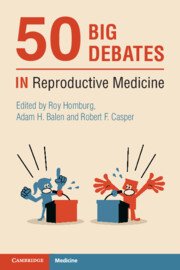Book contents
- 50 Big Debates in Reproductive Medicine
- Series page
- 50 Big Debates in Reproductive Medicine
- Copyright page
- Contents
- Contributors
- Foreword
- Introduction
- Section I Limits for IVF
- Section II IVF Add-ons
- Section III The Best Policy
- Section IV Embryology
- Section V Ethics and Statistics
- 30A Sex Selection Should Be Permitted for Family Balancing
- 30B Sex Selection Should Be Permitted for Family Balancing
- 31A Reproductive Medicine Should Be Publicly Funded
- 31B Reproductive Medicine Should Be Publicly Funded
- 32A Gamete Donation Should Be Anonymous
- 32B Gamete Donation Should Be Anonymous
- 33A Uterus Transplantation Is a Step Too Far
- 33B Uterus Transplantation Is a Step Too Far
- 34A Meta-analysis Should Not Be Considered Class A Evidence
- 34B Meta-analysis Should Not Be Considered Class A Evidence
- Section VI Male-factor Infertility
- Section VII Genetics
- Section VIII Ovarian Stimulation
- Section IX Hormones and the Environment
- Index
- References
34A - Meta-analysis Should Not Be Considered Class A Evidence
For
from Section V - Ethics and Statistics
Published online by Cambridge University Press: 25 November 2021
- 50 Big Debates in Reproductive Medicine
- Series page
- 50 Big Debates in Reproductive Medicine
- Copyright page
- Contents
- Contributors
- Foreword
- Introduction
- Section I Limits for IVF
- Section II IVF Add-ons
- Section III The Best Policy
- Section IV Embryology
- Section V Ethics and Statistics
- 30A Sex Selection Should Be Permitted for Family Balancing
- 30B Sex Selection Should Be Permitted for Family Balancing
- 31A Reproductive Medicine Should Be Publicly Funded
- 31B Reproductive Medicine Should Be Publicly Funded
- 32A Gamete Donation Should Be Anonymous
- 32B Gamete Donation Should Be Anonymous
- 33A Uterus Transplantation Is a Step Too Far
- 33B Uterus Transplantation Is a Step Too Far
- 34A Meta-analysis Should Not Be Considered Class A Evidence
- 34B Meta-analysis Should Not Be Considered Class A Evidence
- Section VI Male-factor Infertility
- Section VII Genetics
- Section VIII Ovarian Stimulation
- Section IX Hormones and the Environment
- Index
- References
Summary
Meta-analyses aim to combine the results of a number of smaller studies, looking at similar outcomes, in order to draw support for or against the use of a therapeutic intervention. Some consider meta-analysis as the highest form of evidence yet; their clinical value is limited to summarising aggregated data that cannot distinguish between patients with different clinical profiles.
- Type
- Chapter
- Information
- 50 Big Debates in Reproductive Medicine , pp. 173 - 174Publisher: Cambridge University PressPrint publication year: 2021

